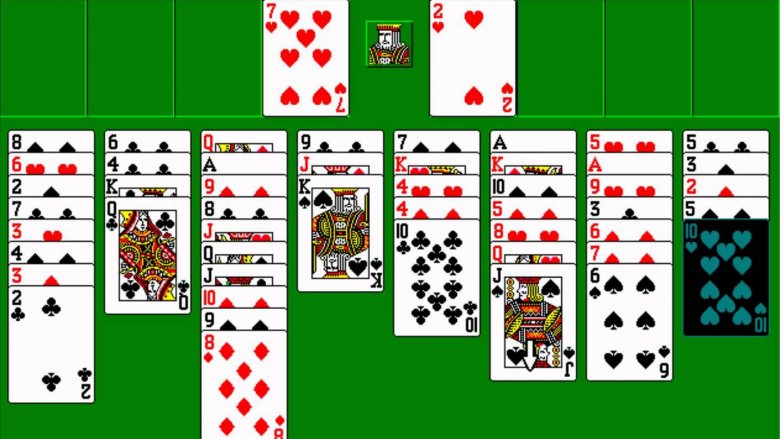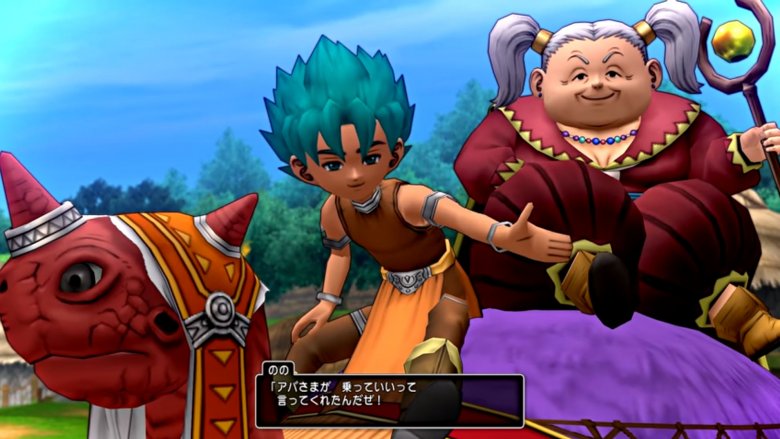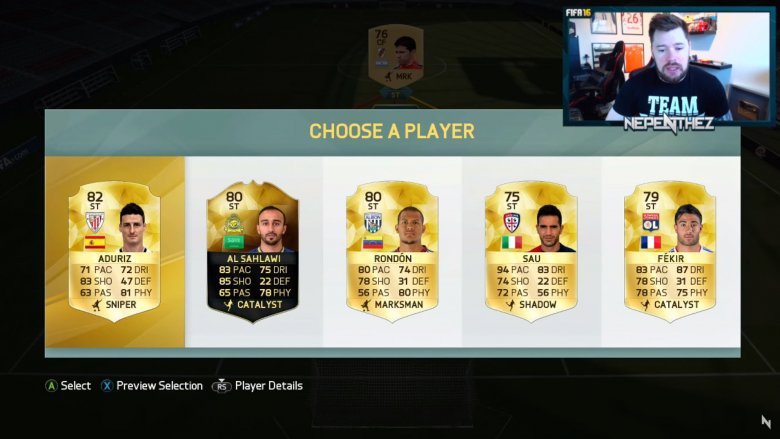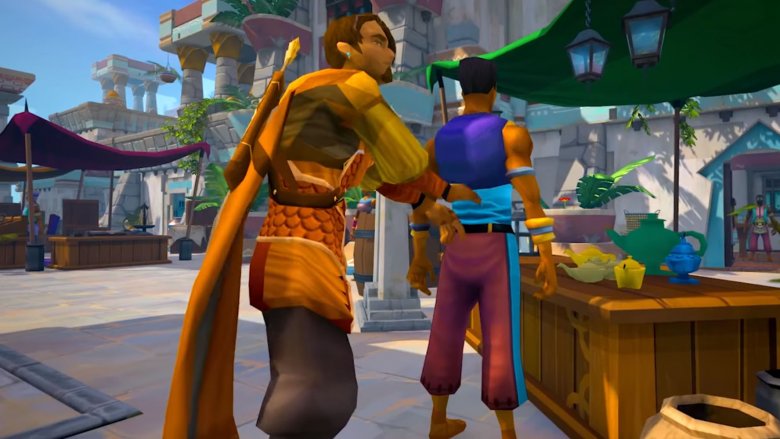Games That Ruined People's Lives
A video game is supposed to be fun. A pastime. A chance to kick back, turn off your brain, and unwind.
And then, when you're not paying attention, that's when they get you. A video game can wreak havoc on your relationships. It can cost you your job. If you're not careful, you might get attacked, arrested, or—in extreme cases—even killed, just for playing a game. So be safe, stay vigilant, and whatever you do, avoid these life-ruining titles. Trust us, your future self will thank you.
Fortnite: Battle Royale
We already know that Fortnite: Battle Royale is threatening to derail teenagers' educations, but just because you're an adult don't assume that you're out of the danger zone. As of August 2018, the game has a staggering 125 million players. A game doesn't get that many players by catering exclusively to kids, and Fortnite's 100-player deathmatches have captured the attention of children, senior citizens, and everyone in-between.
That includes married couples, many of whom find the combination of Fortnite's quick-paced gameplay and ongoing storylines impossible to resist. If that sounds like you, well, watch out: there's a lot more at stake than just another Victory Royale. According to the UK's Divorce Online, Fortnite has been cited in over 200 of the divorce applications handled by the company in 2018. "These numbers equate to roughly five percent of the 4,665 petitions we have handled since the beginning of the year," Divorce Online explains via press release. "As one of the largest filers of divorce petitions in the U.K. is a pretty good indicator" that the game is bringing marriages to an unceremonious end.
Now, Divorce Online makes its hay off of failed marriages, and Fortnite is one of the biggest things on the planet. This release is probably an attempt to get some free press courtesy of gaming's biggest trend. Still, who knows? Next time you fire up Fortnite, consider starting Duos squad with your loved one.
Pokémon Go
Don't be fooled by all the cute little critters: Pokémon Go is bad news. While wandering around in a vain effort to catch 'em all, people have been mugged, stabbed, and shot. In Australia, a man drove into a school while trying to catch a Pokémon on his phone. In southern California, two men were so distracted by the augmented reality game that they wandered off of the edge of a cliff, requiring a full rescue and immediate medical treatment.
And then there's the emotional cost. In summer 2016, when Pokémon Go madness was at its peak, Queens resident Evan Scribner decided to play the game while visiting an ex-girlfriend for a quick hook-up. There were only two problems: Scribner already had a committed partner (one who definitely wouldn't approve of Scribner's extra-curricular sexy times), and Pokémon Go records not just which Pokémon you've caught, but where exactly you caught them.
You can probably see where this one's going. Scribner's then-current girlfriend booted up his phone, saw that he'd been visiting Brooklyn—where the ex lived—and confronted him. Scribner didn't have a good excuse, and the woman kicked him to the curb. News reports didn't specify which Pokémon tipped the good lady off, but we hope it was at least something rare. A Pidgey is definitely not worth all that drama.
Solitaire
There's a time and a place for everything, and for Solitaire, it's definitely not the office in the middle of the work day. Try telling that to the millions and millions of people who've played Solitaire on their Windows machines since the classic card game's best-known digital recreation debuted in 1990. Originally included in Windows as a way to make users more comfortable with Microsoft's visual operation system, Solitaire—all three versions of it—went on to become the most-used piece of software on the platform, and one of the most popular games of all time.
But for Edward Greenwood IX, a former employee of the New York City government, a quick round of the classic time-waster ended with life-changing results. In 2006, then-New York City mayor Michael Bloomberg visited the city's Albany office, where Greenwood worked as an assistant. While Bloomberg posed for photos with employees, he saw Solitaire up on Greenwood's monitor. Greenwood lost his job three weeks later, ending a six-year career in city government. Solitaire was the reason.
"There's nothing wrong with taking a break," Bloomberg said, defending his decision, "but during the business day at your desk, that's not appropriate behavior." Greenwood left his position immediately, receiving no severance pay or advance notice, and while he claims not to hold a grudge, he doesn't think that Bloomberg's decision was fair, either. Greenwood claims to be a hard worker who always got his work done on time. "He's the boss, so if this is the way he wants it handled, there's nothing I can do about it," Greenwood admitted. "But am I happy about it? No."
StarCraft 2
For the very best video game players in the world, there's a lot of money to be made in esports—and not always legitimately. In October 2015, the Korean eSports Association announced that nine people, including two top-tier StarCraft 2 players and a gaming journalist, had been arrested for accepting bribes from an "unnamed criminal organization" in return for throwing professional StarCraft matches.
That was just the beginning. In January 2016, the investigation continued, and the Korean eSports Association arrested Lee "Life" Seung Hyun, rocking the StarCraft community. After debuting in 2011, Life quickly established himself as one of the best StarCraft 2 players on the planet, winning the unofficial Triple Crown title twice (a feat only accomplished by eight players total), dominating major tournaments, and racking up over $465,000 worth of prize money.
According to authorities, Life threw two matches for 35,000,000 Korean won (roughly $31,000) each at the behest of a player-turned-journalist known as Enough, who was rounded up as part of the original 2015 StarCraft sting. The court found Life guilty and banned him from competitive StarCraft matches for life, fined him 70,000,000 won—i.e. everything he received for match-fixing—and sentenced him to 18 months in prison suspended by three years. That means that if Life stays on the straight and narrow during his probationary period, he'll avoid jail time. If not, he'll go to prison. Either way, he'll never play a high-profile game of StarCraft 2 ever again.
Dragon Quest
In the United States, Dragon Quest is a popular but relatively niche video game series. In Japan, it's a bona fide cultural phenomenon. Universal Studios Japan is getting its own Harry Potter Land-like Dragon Quest-themed attraction. Despite the rumors, the day a new Dragon Quest game comes out isn't a national holiday, but it might as well be. The series' first portable entry, the Nintendo DS' Dragon Quest IX, was so popular that hundreds of people crowded together in public spaces for months, working through the game together while enjoying the game's newly implemented social features.
Still, you can have too much of a good thing, as viewers of the Japanese reality show Is It OK If We Follow You Home? learned. In one episode, the camera crew tracked a 43-year-old engineer named Kaccho from the streets of Osaka into his small apartment, which was stuffed full of valuable Dragon Quest memorabilia. But Kaccho isn't just a collector—he's an active gamer, who claims that franchise's massively multiplayer online role-playing installment, Dragon Quest X, destroyed his family.
"I used to look after my kid until I started gaming too much," Kaccho says, and fondly recounts memories of playing Dragon Quest X alongside his daughter. It didn't last. Thanks to Kaccho's non-stop gaming, his wife filed for divorce and took the child with her (Kaccho tried to get custody of his daughter, but lost in court). Now, he has no contact with either his ex or his kid, and whiles away the time in Dragon Quest X by playing as a digital recreation of his daughter. Kaccho claims that he's lonely without his child, but he hasn't made much of an effort to contact her, either—after all, there are still so many monsters left to kill.
Second Life
In Second Life, a completely open and player-driven virtual world, users can be anyone and do anything—including cheating on their real-life partners. While Second Life isn't all about sex, sex is a big part of the game's ongoing appeal, especially for people with more taboo fetishes. Digital worlds offer an excellent place for people to experiment without being judged or ridiculed (like many online communities, Second Life is anonymous), and hey, it's a fantasy world anyway. You might as well go all out.
Just because there's no physical contact doesn't mean that there aren't any emotional ties, however, and for some practitioners, virtual sex can be just as intimate as the real thing. Many players log in to Second Life to indulge in a little bit of anonymous digital kink, only to form real bonds with their partners. Sometimes—say, if one of the users is already in a real-life relationship—that's not a good thing, and the internet is rife with stories of real-world couples who split after one or both members used Second Life to engage in some online infidelity.
In 2008, Amy Pollard caught her husband, David, canoodling with one of the hostesses at his Second Life-set nightclub and filed for divorce. Around the same time, a woman named Carolyn slowly drove away her four children and her long-suffering husband while engaging in an online affair with a man named Elliot, only to meet her internet beau in real life and realize that they had absolutely nothing in common. A few years later, a man called Matt discovered that not only was his wife married to another man in Second Life, but their relationship had moved offline, too. Matt responded by ripping the internet connection out of the wall, his wife answered with a punch, and the marriage abruptly ended.
Sudden Attack
Cheating in online games sucks for everyone except for the cheater, but it doesn't normally ruin lives—unless you happen to live in Japan. A few years ago, Japanese police arrested three teens for creating and selling cheats for the free-to-play multiplayer shooter, Sudden Attack, and charged them with criminal offenses.
Allegedly, the trio made about $80,000 selling cheats to other players, most of which were developed by a 17-year-old high school student and an 18-year-old college senior (the third member of the group advertised the final products using online streaming services). That's a lot of money, and Japanese authorities took notice. All three members of the group were charged with "obstruction of business"—in other words, by making Sudden Attack less fun to play, the cheats were hurting publisher Nexon's bottom line. That's backed up by the number of complaints Nexon received about cheaters, which it forwarded on to police, although Nexon promises that the authorities' decision to pursue a criminal case was made on the police's "own volition."
The case marked the first time that cheat-makers faced criminal charges in Japan, although it wouldn't be the last. About a year later, police arrested a 30-year-old man for selling cheats and super-powered accounts for free-to-play games like Alliance of Valiant Arms, Special Force 2 and Dragon Nest, raising about $168,000—and violating Japan's Unfair Competition Prevention Law, which protects companies' trade secrets—in the process.
Kingdoms of Amalur: Reckoning
Former Red Sox pitcher Curt Schilling isn't just a six-time MLB All-Star and the proud owner of three World Series rings. He's also an avid gamer who spent his oodles of downtime—as a starting pitcher, Schilling only took the mound every five days—plugging away at EverQuest and World of Warcraft. Once Schilling's major league career ended, his next challenge was very, very clear: he'd found a video game studio and develop the game he always wanted to play.
As Schilling quickly learned, making a video game and throwing a 98 miles-per-hour fastball are two very different skills. His company, 38 Studios (named after Schilling's jersey number) quickly put two titles into development: a fantasy MMORPG that never saw the light of day, and a single-player role-playing game called Kingdoms of Amalur: Reckoning, which was set in the same world. Schilling poured $50 million of his own money into the projects while securing a $75 million loan from Rhode Island in the hope that 38 Studios could jumpstart the state's game development community.
It didn't work out that way. Kingdoms of Amalur received positive reviews and sold over a million copies, but fell short of moving the three million units it needed to break even. Meanwhile, 38 Studios ran out of cash (which, according to a lawsuit, Schilling tried to hide from the board) and defaulted on its payments to Rhode Island. In 2012, 38 Studios filed for bankruptcy. Schilling claimed he'd lost all the money he made during his long and fruitful baseball career, and as a result of 38 Studios' failure, he was forced to sell many of his most prized possessions, including his seven-bedroom, 8,000-square-foot home and a bloody sock he wore while pitching in the 2004 World Series.
Counter-Strike: Global Offensive and FIFA
With the rise of esports and streaming, video game gambling has become a real and serious problem. Not only is the video game gambling industry largely unregulated—and, therefore, on shaky legal ground in many countries—but a large portion of the video game-playing audience (especially those who glom onto popular YouTubers) is made up of children.
It's a combination that's very, very illegal, as some big gaming personalities have learned the hard way. In summer 2016, a YouTuber known as HonorTheCall revealed that two other Counter-Strike: GO streamers, Trevor "TmarTn" Martin and Thomas "ProSyndicate" Cassell, promoted the Counter-Strike betting site CSGO Lotto on their channels—a site that Martin and Cassell also happened to own. It's a complicated issue—ZAM has a good explanation at its site—but suffice it to say that both Martin and Cassell are currently facing civil lawsuits, including one from a mother who claims that her son, a minor, followed Martin and Cassell's instructions and subsequently lost quite a bit of money gambling online.
The case of Dylan Rigby and Craig "NepentheZ" Douglas' is more straightforward. In court, both men pled guilty to allegations that they encouraged fans to check out the website FutGalaxy, where users can use FIFA coins (which are purchased for real money) to bet on actual sports events. Not only are many of Douglas' fans minors (Douglas even claimed—incorrectly—that it was okay for kids to use FutGalaxy in some of his videos), but FutGalaxy doesn't verify users' ages before letting them bet online. That got Rigby and Douglas in trouble with British authorities, who charged both with criminal offenses—the first time anyone has ever faced criminal charges for video-game-based betting—and ordered them to pay a cumulative £265,000 in fines and prosecution fees. Ouch.
Lineage II
What happens online, stays online—until it doesn't. Lineage II may not have the worldwide brand recognition of massively multiplayer online role-playing games like EverQuest, World of Warcraft, or Final Fantasy XIV, but rest assured, it has all the staples of that genre: a big, sprawling world filled with monsters to fight and loot to earn, a sizable group of players that serve as both allies and enemies, and player-created guilds in which groups of players can team up to beat the stuffing out of others.
In other words, competition in Lineage II can get very, very heated. Sometimes, a little too heated. In 2008, a 30-year-old Lineage II player from Moscow's Platanium guild killed a member of the Coo-clocks clan, which was made up of college students, in-game. Naturally, the Coo-clocks didn't appreciate the attack, and decided to retaliate. Instead of settling the feud online, however, the two groups decided to meet up in person to hash things out in a real-life fistfight.
It didn't go well. In the ensuing brawl, the original Platanium attacker was beaten so badly that he died from his injuries on the way to the hospital. Murdering a living, breathing human being wasn't enough for the Coo-clocks, either. After the poor Platanium member was buried, the Coo-clocks continued to send death threats to the victim's family and proceeded to harass the surviving Platanium members online.
The most chilling aspect of this whole story? It's happened before. As the original Russia Today report notes, before the Platanium and Coo-Clocks skirmish broke out, a Ukrainian Lineage II player traveled to Moscow to confront his online nemesis in person. The confrontation ended in the Moscow resident's demise. If you have an online spat, try to settle things on the computer—and if that's not possible, at the very least, stay the hell out of Russia.
Runescape
Do virtual items have real-world value? According to the Dutch Supreme Court, they do—that's how the court explained its decision to convict a teenager for theft after he attacked another kid and forced the victim to turn over an amulet and mask that he'd earned in the online role-playing game Runescape.
The real-life mugging took place in 2007, when the 15-year-old assailant and a lackey pulled a knife on his 13-year-old target and beat on the poor gamer until the teen agreed to boot up Runescape and drop the items in question, leaving them available for the attacker to claim. At the very least, that's assault—even if the property was virtual, the beating was very, very real. The defendant's lawyers argued that the mask and amulet "were neither tangible nor material and, unlike for example electricity, had no economic value," but the court disagreed.
"The time and energy [the teen] invested" while earning the items gave them an intrinsic value—at least to the player—and the court found the mugger guilty of theft and sentenced him to 144 hours of community service, which would probably be enough time to grind out an amulet and mask of his own if he wasn't too busy, y'know, serving time.










